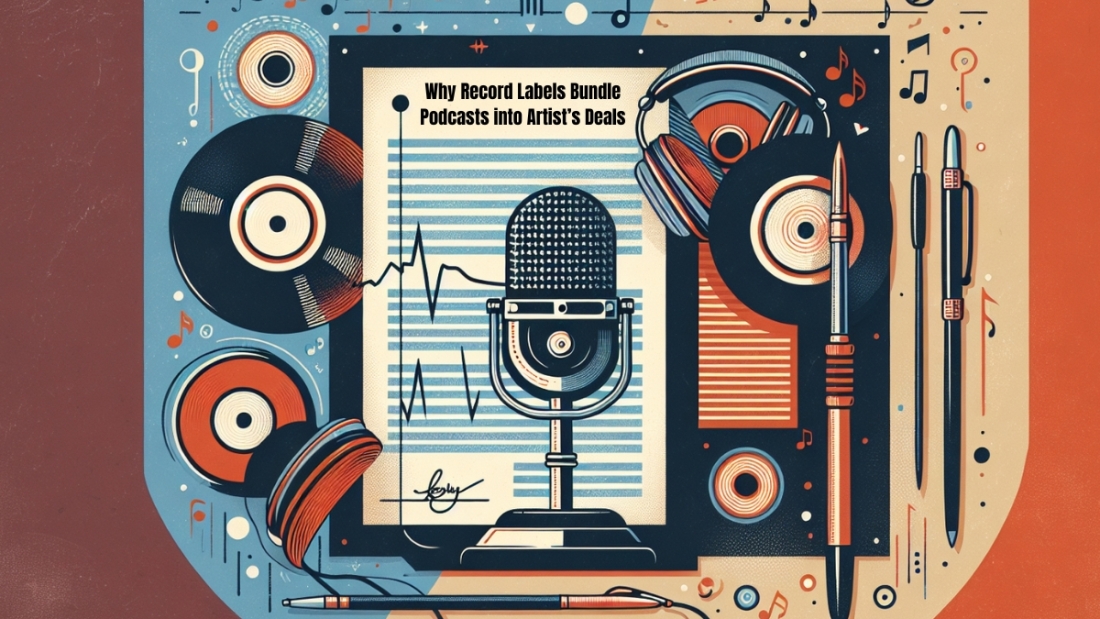The music industry has gained a supplement and it’s not music. Podcasts have emerged as a pivotal element, offering an innovative platform for storytelling, advertising, and monetization. This evolution presents a unique opportunity for record labels to expand their repertoire, and they have done such. Not only by promoting existing music catalogs, but now creating original shows that bolster their brand’s presence on streaming platforms.
The integration of podcasts into label agreements marks the shift towards a more diversified and profitable content strategy, aligning the interests of record labels, content creators, and music enthusiasts. With the rise of influential platforms and personalities, the landscape is ripe for exploration and growth. The relationship between record labels and podcasts highlights the advantages such as enhanced licensing options, increased visibility for artists, and new revenue streams.
The Rise of Podcasts in the Music Industry
The phenomenon has its roots deeply embedded in the early 2000s. The digital audio streaming innovations began to reshape how content was consumed, lagging behind music. This period marked the transition from traditional media to more personalized digital platforms, setting the stage for podcasts to thrive.
In recent years, the integration of podcasts into the music industry has accelerated, driven by the thirst for on-demand content. Record labels have recognized the insane growth of podcasts in the 2020’s. Now, it’s way more than a marketing tool, and has been creatively leveraged by many.
Key Benefits for Record Labels
Podcasts provide a multifaceted platform for record labels to enhance their promotional strategies and revenue generation. One significant advantage is deeper engagement, where artists share their creative processes and personal stories through interviews and discussions. Additionally, featuring on a popular music podcasts can significantly boost an artist’s visibility.
The longevity of podcasts also offers an extended shelf life for music promotion. Unlike traditional media that may quickly become outdated, podcast episodes can continue to attract listeners and promote music long after their initial release. If successful, the business opportunities include sponsorships, ads, and premium content.
From an industry perspective, record labels, music festivals, and radio stations are increasingly are launching podcasts to reach this wider audience. Artists see podcasts as an opportunity to build brand loyalty, and drive streams. This strategic integration not only enhances user engagement by offering diverse more content in this on-demand media era. Furthermore, major labels like Sony Music are exploring podcasts as a potential avenue for content licensing, recognizing the need for infrastructure and expertise in managing audio content at scale.
Notable Examples
In recent years, numerous musicians have ventured into this world. Creating engaging content that connects them more intimately with their fans is what is in demand. One notable example includes Rick Ross, where he speaks on entrepreneurship, music industry insights, and personal anecdotes, offering listeners a glimpse into the mind of a successful rapper and businessman. Even after musicians are done making music, they now have another avenue for success. The most perfect example of them all would be Joe Budden, who has made significant earnings podcasting. This trend of musicians launching podcasts allows them to share their personal stories, and insights never heard before. It also fans a more direct access to artists in ways that were not so mainstream before. Let us not forget the meme potential as well.
Potential Challenges and Considerations
In the evolving landscape of the music industry, integrating podcasts into record label strategies presents unique challenges, particularly concerning licensing issues and market competition. The market is becoming increasingly saturated, with over a million podcasts available on platforms like Apple Podcasts. For a new podcast, distinguishing itself in a crowded market requires a deep understanding of its competitive landscape. This involves analyzing competitors’ strengths and weaknesses and identifying gaps that can be filled to attract a targeted audience.
For instance, podcasts focusing on niche topics like music for podcasting face stiff competition, which can limit their visibility and growth unless they effectively differentiate themselves from existing offerings. Overall, while podcasts offer record labels a new avenue for promotion and revenue, these potential challenges must be carefully considered and addressed to fully capitalize on the opportunities podcasts present.
The intersection of podcasts and the music industry signifies a revolutionary tilt towards digital diversification, embracing the symbiotic relationship between audio storytelling and musical expression. Through strategic integration into record label agreements, podcasts not only offer a fresh avenue of revenue but a new skillset required for artists.
The examples of Rick Ross and other ventures into the podcasting space illustrate the showcase listeners desire for storytelling in addition to music. It is the new medium potential to expand brand and artist visibility in a crowded digital marketplace.





Leave A Comment